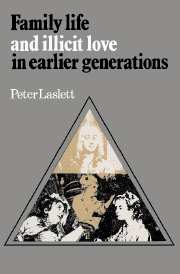Book contents
- Frontmatter
- Contents
- Introduction: the necessity of a historical sociology
- 1 Characteristics of the Western family considered over time
- 2 Clayworth and Cogenhoe
- 3 Long-term trends in bastardy in England
- 4 Parental deprivation in the past: a note on orphans and stepparenthood in English history
- 5 The history of aging and the aged
- 6 Age at sexual maturity in Europe since the Middle Ages
- 7 Household and family on the slave plantations of the U.S.A.
- Bibliography
- Index
7 - Household and family on the slave plantations of the U.S.A.
Published online by Cambridge University Press: 12 September 2009
- Frontmatter
- Contents
- Introduction: the necessity of a historical sociology
- 1 Characteristics of the Western family considered over time
- 2 Clayworth and Cogenhoe
- 3 Long-term trends in bastardy in England
- 4 Parental deprivation in the past: a note on orphans and stepparenthood in English history
- 5 The history of aging and the aged
- 6 Age at sexual maturity in Europe since the Middle Ages
- 7 Household and family on the slave plantations of the U.S.A.
- Bibliography
- Index
Summary
During the extraordinary development of Negro slavery which accompanied the plantation by the Europeans of the West Indian islands and of parts of the American continent, the status of the slave as progenitor and as offspring was variously interpreted. The English-speakers amongst the planters, like the Ancients, held to the principle that the slave could not legally marry. He or she could be neither husband nor wife, son nor daughter, according to the law: no slave union was legally recognized and no slave could be a legitimate child. Indeed, the relationship between owning persons and persons owned, between white and black, was such that a slave could not expect to have that legally sanctioned sexual monopoly in a partner which is a defining characteristic of marriage. The independent status which confers authority on a household head over spouse and offspring had very little on which to rest. Yet slave men and women did make and did maintain marriage-like associations: the word marriage perpetually recurs in the discussion of their situation: the plantation recognized ‘marriage’ even if the law did not. Moreover, slaves most certainly procreated children. It was in the interest of their masters that they should maintain their numbers, and if possible increase.
Here then was present within the meticulously and authoritatively structured society of Western European family groups in America a growing collection of peculiar persons who stood outside the official familial system.
- Type
- Chapter
- Information
- Family Life and Illicit Love in Earlier GenerationsEssays in Historical Sociology, pp. 233 - 260Publisher: Cambridge University PressPrint publication year: 1977



